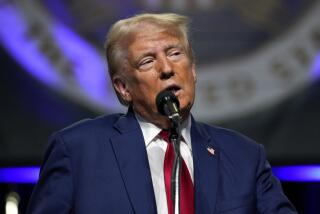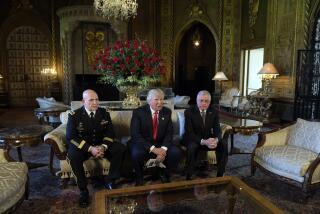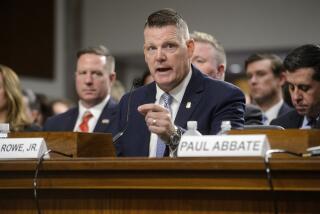Ridge faces challenge as he takes counterterror post
Tom Ridge opens the White House Office of Homeland Security today, one day after the U.S. military strike that has likely raised the nation’s need for protection to new heights. He will have a staff of roughly 100 aides on loan from a variety of agencies and departments. He will have Cabinet-level status, a desk in the West Wing and, perhaps most important, the ear of a president whose family he has known for 20 years.
But it’s far from clear whether the former Pennsylvania governor will command other tools that many national security analysts and lawmakers say would be indispensable to managing the nation’s protection of itself: some control over the budgets of dozens of government shops that deal with counterterrorism and authority over other agency and department heads in matters related to the country’s security.
Without such powers, many analysts say, the new office could become little more than a symbolic attempt to confront the 21st-century threat that, as last month’s deadly events demonstrated, has confounded the nation.
“Either Governor Ridge gets that or Governor Ridge might as well go home,” says Anthony H. Cordesman, a terrorism specialist at the Center for Strategic and International Studies.
Without influence over long-term planning and budgeting and the authority to guide the counteterrorism activities of agencies, Ridge, a Republican who resigned as governor Friday, becomes merely “the largest deck chair on the Titanic,” Cordesman says.
In announcing the military action yesterday, Bush acknowledged the sense of unease many Americans feel, an uncertainty he hopes the establishment of Ridge’s office will go a long way toward calming.
“I know many Americans feel fear today,” Bush said. “And our government is taking strong precautions: Our law enforcement and intelligence agencies are working aggressively around America, around the world and around the clock; at my request many governors have activated the National Guard to strengthen airport security; we have called up reserves to reinforce our military capability and strengthen the protection of our homeland.”
So far, the administration has described Ridge’s job as mainly one of coordination, with his degree of authority and budget control vague.
“He’ll have a lot of clout,” said Andrew Card, the White House chief of staff. “This leader will be a real leader for homeland security.”
Ridge told reporters last week: “There are so many laws and regulations that have to be sorted through to identify specifically what I can and cannot do in this position. But what I do know is this: The president has said, ‘You’ll have the authority and the personnel that you need to get the job done that I have asked you to do.’”
Ridge’s mission is to coordinate the disparate counterterrorism programs spread among 46 federal agencies, many of which were created after the 1993 World Trade Center bombing, the Oklahoma City bombing in 1995 and the sarin gas attack on a Tokyo subway that same year.
For instance, the Department of Health and Human Services, among many other anti-terrorism activities, works on stockpiling vaccines and antibiotics to respond to biological or chemical attacks. The Transportation Department oversees a range of activities, from airport security to the Coast Guard’s seaborne patrols. Border security is the domain of the Justice, Treasury and Transportation departments. The Agriculture Department works to prevent attacks on the food supply.
Together, such programs are expected to cost $13 billion next year, a total that will likely increase in the aftermath of last month’s terrorist attacks and as the threat of new acts of terrorism in retaliation for U.S. military action looms.
“Ridge has to set up a capacity to plan for an end-to-end system, from detection, deterrence and prevention to, at the end, retaliation and repair,” says Joseph Nye, dean of Harvard’s Kennedy School of Government. “He’s got to think about what we need at each step.”
Ridge is also to run a new Homeland Security Council that will include several Cabinet secretaries and the directors of the FBI and Federal Emergency Management Agency.
The administration has portrayed Ridge’s position as being the domestic equivalent of the national security adviser, a post created in the early days of the Cold War to coordinate national defense, diplomacy and intelligence for the president.
Much as Condoleezza Rice derives a large part of her influence as Bush’s national security adviser from her close relationship with the president, Ridge’s reputation as a trusted Bush friend will count for a great deal, security analysts say.
And a number of national security advisers, though lacking budget control and direct authority over other agencies, emerged as major forces within the administrations they served. Henry A. Kissinger, for example, was the major foreign policy voice of the Nixon administration.
Zbigniew Brzezinski in the Carter administration, Brent Scowcroft in the first Bush administration and Samuel R. Berger under Bill Clinton were all invested with much authority by their bosses and therefore became powerful foreign policy players.
“At the end of the day, you need someone who can say, ‘This is the way it’s going to be done. This is the president speaking,’” says former Indiana congressman Lee Hamilton, director of the Woodrow Wilson International Center for Scholars.
But he and others say Ridge’s power to influence the budgets of those agencies within his ken will be a crucial factor in determining his success. Without that, government officials past and present say, they envision endless turf wars and bureaucratic stagnation, with Ridge merely another in a series of toothless “czars” who have had little success in recent years grappling with energy, education and drugs.
“He’ll be sitting at the table with some pretty powerful actors,” Hamilton says. “Every one of those secretaries and directors who will be sitting around the table will have one thing uppermost in their mind - that is, to protect their turf. That’s exactly what you don’t want.”
Scott McClellan, a White House spokesman, said Ridge would have “input” into the budgets of other agencies, making sure they reflect the priority that anti-terrorism programs will now be given. But the extent and weight of his input is unclear.
There is no plan, for instance, to include Ridge in the four-member budget review committee that is responsible for resolving budget disputes among department heads.
Kennedy School Professor Ashton B. Carter, assistant defense secretary in the Clinton administration, said Ridge’s office must have a direct hand in long-term budget planning for all activities related to homeland defense, determining, for instance, which agency will develop air-filtration systems and anthrax detectors.
“Ridge should be the one saying, ‘This is who gets it in their budget,’” Carter says.
In the past several years, three commissions and the General Accounting Office have pointed to grave U.S. vulnerabilities to terrorism and a fragmented government approach. These studies have recommended similar sorts of homeland security offices. Until now, however, little action was taken.
Clinton created a coordinating office for counter-terrorism within the National Security Council. But its director, Richard A. Clarke, who will now head cyber-security in the Ridge operation, was not seen as having enough authority to be effective.
Vice President Dick Cheney was given the task several months ago of coming up with a plan for some sort of homeland security coordination and rushed his proposal forward after Sept. 11.
“Radical change requires radically changed consciousness,” says Daniel Benjamin, a senior fellow at the Center for Strategic and International Studies. “That did not exist.”
Benjamin, director for transnational threats in the Clinton administration’s NSC, predicts that in the aftermath of the Sept. 11 disaster, Ridge will have the cooperation of his counterparts in the Cabinet. “But as things become normalized,” he says, “it will be very hard to keep that comity between agencies.”
During a farewell news conference at the Capitol in Harrisburg last week, Ridge said he may have to “break a little china along the way,” but generally expected cooperation.
Some Capitol Hill lawmakers favor a more powerful entity than Bush has outlined and have introduced bills that would create a homeland security agency through legislative action rather than executive order. Such an agency would have budgetary authority and power over such operations as border control and emergency management.
Critics and supporters alike applaud Bush’s initiative as a much-needed first step in bringing together all the pieces of the government’s battle against terrorism.
Physicians and public health officials, for instance, say they are optimistic they will have a forum for advising policy-makers on such things as archaic communications systems in some hospitals, where rotary phones are still in use.
The Kennedy School’s Carter says the focus on organization, coordination and who’s in charge could obscure the fact that the nation does not now have the capabilities to confront terrorism -- no matter who’s in charge.
“If Ridge is well advised on how the government works, he will not follow the lead of so many feckless czars and try to be in charge of everything,” Carter says.
“He’ll focus on money and building the nation’s capabilities to counter terrorism in the long run. That’s where he’ll get the authority in Washington. And the new capabilities -- which is what we desperately need -- will be his legacy.”
More to Read
Sign up for Essential California
The most important California stories and recommendations in your inbox every morning.
You may occasionally receive promotional content from the Los Angeles Times.










